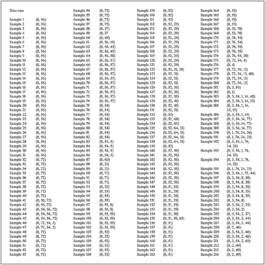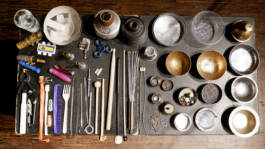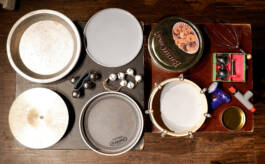sampler/sampled
COVER

description
THE ALBUM
Sampler/Sampled is an album made of two interdependent parts rather than a double-album.
The first part of the project, Sampler, is a trumpet solo album that catalogues the unique sounds and extended techniques that Mazen Kerbaj developed for the instrument in the past 25 years; it consists of 318 pieces ranging from less than a second to forty seconds each, and presenting different sonic materials.
This catalogue of sounds works on various levels: first and foremost, it is a trumpet solo that could be played in its original order, or in random mode to create different pieces of music. But it is also a collection of samples that could be used for various applications (ringtones, phone sound effects, cinema…) and, of course, to create new pieces of music based on sampling.
The second part of the project is the composition Sampled for a musician working with loops and/or samples. The composition has one instruction: create a piece of music using solely tracks from Sampler as your sound source (with the possibility to use all kind of effects or treatment).
Each interpreter/musician becomes thus a co-composer who appropriates the piece and makes it their own. In this regard, the musicians that were commissioned to play Sampled were chosen from different geographical origins and musical genres to create highly different and personal pieces of music.
One important output of this project is putting in practice the overused idea of music as a universal language. This idea is very present in “free improvised music” where musicians from different origins can meet for the first time and make music together without the need to adapt to different musical traditions.
But here, the collective part of creating music in real time is not involved. It is rather the contrary: it starts with one middle-eastern musician creating a new language/vocabulary for his western instrument, to be later used by other musicians from around the globe who will appropriate this vocabulary and use it with their own language/grammar.
The final output of this double faceted album that was recorded during the Covid lockdown proved to be a very efficient new way to collaborate from a distance in times of world isolation, and ultimately put in practice the universality of music by breaking the boundaries of genres that are the most difficult to break.
THE LIVE VERSION
Sampler/Sampled is also a modular concept for an evening of live performances. It could for example start with an acoustic solo by Kerbaj (Sampler), followed by an improvising turntables duo playing a live version of Sampled, then an electronic musician presenting yet another version of it, to end up with a DJ set mixing all the recorded versions of Sampled (Sampled Re-Sampled).
info
Sampler / Sampled
Mazen Kerbaj Trumpet Solo Vol. 3
FEATURING: Deena Abdelwahed, Rabih Beaini, Fari Bradley, Dieb 13, DJ Sniff, Gavsborg (Equiknoxx), Electric Indigo, Donzilla Lion (Nyege Nyege), Marina Rosenfeld, Microhm, Muqata’a, Bob Ostertag, Rrose
Disc one: Sampler
Sampler was performed by Mazen Kerbaj on the trumpet, with or without the addition of various objects (as referenced in the tracks’ titles and the inside catalogue)
A / Samples 1-168
B / Samples 169-318
Disc two: Sampled
Sampled is a composition for one musician using solely Sampler as their sound source
C1 / Blue Malediction – by Deena Abdelwahed and Mazen Kerbaj
C2 / norm hollows function – by Dieb 13 and Mazen Kerbaj
C3 / Pendulum – by Rrose and Mazen Kerbaj
C4 / Untitled – by Marina Rosenfeld and Mazen Kerbaj
C5 / Chainsaw – by Rabih Beaini and Mazen Kerbaj
C6 / Time Traveler – Donzilla Lion (Nyege Nyege) and Mazen Kerbaj
D1 / Trumpet Zoo – by DJ Sniff and Mazen Kerbaj
D2 / Mazen's Trumpet – by Electric Indigo and Mazen Kerbaj
D3 / Untitled – by Muqata'a and Mazen Kerbaj
D4 / Dreams of Dust – by Microhm and Mazen Kerbaj
D5 / The sign to Return is in the Earth's Spin – by Fari Bradley and Mazen Kerbaj
D6 / Now Serving #8190 – by Gavsborg (Equiknoxx) and Mazen Kerbaj
D7 / Untitled – by Bob Ostertag and Mazen Kerbaj
Samples 1 to 318 were recorded by Mazen Kerbaj on December 1-3, 2020. They are presented as recorded, with no additional cuts, overdubbing or use of electronics
Sampled 1 to 13 were recorded by the respective artists between December 2020 and March 2021. All kind of manipulations and effects were used in various proportions in each pieceMixed by Mazen Kerbaj, and the respective musicians.
Mastered by Rashad Becker.
Cover Artwork by Lorenzo Mason Studio with Mazen Kerbaj.
Liner Notes by Nate Wooley.
Produced by Morphine Records and the DAAD Artists-in-Berlin- Program.
Supported by Musikfonds.
Bio
Mazen Kerbaj is widely considered as one of the initiators and key players of the Lebanese free improvisation and experimental music scene. He is co-founder and active member of MILL, the cultural music association behind Irtijal, an annual improvisation music festival held in Beirut since 2001 (www.irtijal.org), and co-founder of Al Maslakh, the first label for experimental music in the region operating since 2005 (www.almaslakh.org).
As a trumpet player, whether in solo performances or with long-lasting groups like “A” Trio, Kerbaj pushes the boundaries of the instrument and continues to develop a personal sound and an innovative language, following in the footsteps of pioneers like Bill Dixon, Axel Dörner and Franz Hautzinger.
Playing in solo has always been an important part of Mazen Kerbaj’s musical journey; it is in this bare-bones setup that he can experiments the most with his instrument, pushing it beyond any recognition. His use of various every-day objects (tubes, plastic bowls, balloons, aluminum foil…) to “prepare” the trumpet, and his unique playing techniques allow him to create raw soundscapes that sound sometimes like electronics (he describes himself his trumpet playing as “playing electronic music, acoustically”), especially when he plays several continuous layers of sound at the same time on an instrument that is not designed for that.
Be it in his various recordings or in live concerts, in acoustic or in amplified setups, Kerbaj’s trumpet solos never fail to surprise.
bandcamp


some of the instruments used (together with the trumpet) to record "SAMPLER"
the rest of the instruments used (together with the trumpet) to record "SAMPLER"
Press
Excerpts
It is also a lesson about letting go of the very essence of Kerbaj’s musical identity and surrendering it completely to others. These interpretations take Kerbaj’s samples to surprising territories, addressing the curious and attentive soul and the liberated body.
[The Free Jazz Collective – Eyal Hareuveni]
The resulting album defies genre!
[The Wire – Mariam Rezaei]
Sequenced across two vinyl sides, Sampler is not simply a glossary of sounds, but a suite of miniature compositions. On Sampled, these brilliantly wrought materials become new compositions.
[The Wire – Stewart Smith]
Everything is completely fragmented and put out for everybody, a sample package like a library for everyone to use. It’s a very special thing, and in my opinion, it’s very generous.
[ExBerliner – Interview with Rabih Beaini]
This record may have [Kerbaj’s] name on it and, no doubt, it is a work of great individual artistry, but it also represents the history of a community, and this contribution should, and will, earn him an exalted place in the history of this music and our time as the first to unlock the sound-hoard.
[From the album’s iner notes by Nate Wooley]
Allerdings überschreitet bis auf eines keines der Stücke auf Sampled dieVierminutengrenze, typisches DJ-Futter stellt also keiner der Mixe dieser Compilation dar, unddas war wohl auch Teil des Konzepts, das nur als extrem gelungen bezeichnet werden kann.Immer wieder erfrischend, daran teilzuhaben, wie inspirierend Klänge und das Sich-Austoben mitihnen mit Hilfe von Samplertechnologie sein kann – sowohl für die beteiligten Musiker als auchfürs Gemüt der Hörer*in.
[Groove.de – Mathias Schaffhäuser]
FULL INTERVIEWS/TEXTS
Other People’s Grammar – Interview in Field Notes Magazine
Lust in Translation – Article in the Wire Magazine
How to Create a Language by Only Using the Trumpet – Interview in ExBerliner
The Sound-Hoard Is Our Library – Album's Liner Notes by Nate Wooley